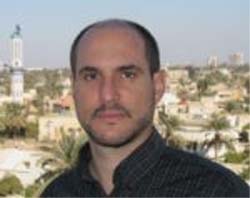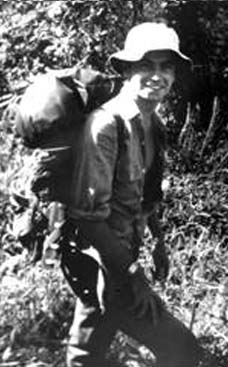
Thousands of Iraqis are finally returning, lured by news of lessening bloodshed in Baghdad and increasingly unwelcome in the neighboring lands where they tried to escape the war. Although they're scarcely a fraction of the roughly 2.2 million who have fled into exile since 2003, they represent a big shift: for the first time since the war began, more Iraqis seem to be re-entering the country than leaving. At the desert outpost of Al Waleed, the main crossing on the Syrian frontier, border police reported 43,799 Iraqis coming home in October—more than five times the number heading out, according to the U.N. High Commissioner for Refugees (UNHCR). Other statistics remain patchy at best, but the signs point toward home. "I can tell you this," says Abdul Samid Rahman Sultan, Iraq's minister of Displacement and Migration (the job title alone tells how bad the problem has been). "Flights from Syria are always full. Flights out are not." Journalist Larry Kaplow served as a Peace corps Volunteer in Guatemala.
Larry Kaplow writes: Refugees are returning to Iraq
There’s No Place Like … Iraq?
Actually, yes. Refugees are returning—but it's tough to resettle them without worsening sectarian divisions.
By Larry Kaplow, Rod Nordland and Silvia Spring | NEWSWEEK
Dec 3, 2007 Issue
[Excerpt]
Dawood is happy to be back in Baghdad. Not that he had much choice. Late last year the cautious, soft-spoken Shiite fled to Syria and on to Lebanon, leaving his wife and their three children in relatives' care while he looked for a safer home. He had begun getting death threats after helping create an Internet hookup for the U.S. Army base at Taji. Dawood (he won't risk the use of his full name) is a 33-year-old IT engineer, but he couldn't find work outside Iraq. His Lebanese visa ran out, and Canada refused his asylum application. So a few weeks ago, practically broke, he returned to Baghdad. His old district is torn by an ongoing Shia-Sunni turf war, but Dawood says he feels safe in the family's new, mainly Shia area. His youngest child, now 3, called him "Uncle" at first, and he's still looking for work, but it's good just to be with his family. "I'll tell you something about missing Baghdad," he says. "When I'm in Baghdad, I don't want to hear any Iraqi music. But when I'm somewhere else, all I want to hear is Iraqi music."
Thousands of Iraqis are finally returning, lured by news of lessening bloodshed in Baghdad and increasingly unwelcome in the neighboring lands where they tried to escape the war. Although they're scarcely a fraction of the roughly 2.2 million who have fled into exile since 2003, they represent a big shift: for the first time since the war began, more Iraqis seem to be re-entering the country than leaving. At the desert outpost of Al Waleed, the main crossing on the Syrian frontier, border police reported 43,799 Iraqis coming home in October—more than five times the number heading out, according to the U.N. High Commissioner for Refugees (UNHCR). Other statistics remain patchy at best, but the signs point toward home. "I can tell you this," says Abdul Samid Rahman Sultan, Iraq's minister of Displacement and Migration (the job title alone tells how bad the problem has been). "Flights from Syria are always full. Flights out are not."
While the killing has slowed, it hasn't stopped: a bomb in a crowded Baghdad market on Friday killed at least 15 and wounded more than 50 others. Still, life outside Iraq gets tougher all the time. The UNHCR has managed to resettle no more than 20,000 refugees, and only 2,050 have come to America. Syria, the region's last country that offered free access to Iraqis, has cracked down on new entries and forbidden Iraqis to hold jobs. "They put a stamp in your passport that says NO WORK," Dawood says. Jordan, Lebanon and Egypt enforce similar bans. Public schools in Lebanon and Egypt are closed to Iraqi children. In October, Syria imposed a new visa-renewal fee on its estimated 1.5 million Iraqi residents. Each family member must now pay $50 every three months or face deportation. That's serious money: the average Iraqi family's size is at least six. Throughout the region, only the richest and most skilled Iraqi refugees are welcome anymore—the ones Iraq needs most.
Iraq's budget for this year includes $25 million to help displaced Iraqis go home. That's less than $6 a person. The years of violence have uprooted roughly 4.5 million Iraqis, including 2.3 million or more IDPs—internally displaced people. (Next year's total has been raised to $100 million.) Nevertheless, Baghdad is doing its best to get them home. Last week an Iraqi Embassy official in Damascus announced that as of Nov. 26, Iraq's government will begin special bus convoys under military guard for any Iraqis returning from Syria. Dawood made the risky trip in a friend's unescorted SUV, right through Anbar province. A cousin died on that route last year, killed by gunmen after he refused to curse the Prophet Muhammad's son-in-law Ali, who is revered by Shiites. But Dawood's friend said not to worry: he had good connections in Anbar. They drove in tense safety through the night, down Anbar's straight, flat roads. A few hours before dawn, they reached Baghdad's outskirts, where they had to wait for morning to enter the city. Dawood's wife was furious when he arrived: to save her from worrying, he hadn't told her he was on his way.
IDPs returning to Baghdad can get government aid of 1 million dinars (about $800) to ease the transition. In the past two months the Displacement Ministry says that roughly 3,600 families have collected theirs, and 6,000 others have begun the registration process—a total of nearly 60,000 returnees, if the families are average size. Zahra Lami Hamoud received her family's allotment last week. She's thrilled to be back in her old house in Baghdad's Ameriya neighborhood. (The lingering effects of sectarian warfare have kept most returnees out of their original homes.) "It's so safe, we can even leave the door open and nothing will happen," says Hamoud.
Still, there are problems. The money is about enough to fix all the broken windows, but it won't begin to replace the furniture that was looted in their absence. Besides, the house is a triplex. Hamoud's in-laws used to have the other two units, now occupied by Sunni fugitives from Shiite-led ethnic cleansing in the Jihad neighborhood. Hamoud says when her husband asked them to leave, they refused, saying: "If you get the people out of our house in Jihad, we'll go back there." There's not much the family can do. Local militias aren't likely to tolerate forcible evictions in either neighborhood, and U.S. officials also forbid them, fearing renewed bouts of ethnic cleansing. In Baghdad, most returnees are resettling in neighborhoods dominated by their particular sect, cementing sectarian divisions.













